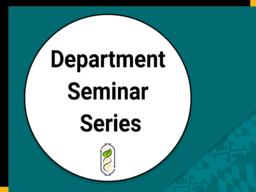Department Seminar Series - Nykia D. Walker, Ph.D
University Of Maryland, Baltimore County
Location
Engineering : 027
Date & Time
October 17, 2022, 12:00 pm – 12:50 pm
Description
Harvesting an Alternative Approach to Breast Cancer Metastasis
Abstract
Triple-negative breast cancer (TNBC) patients have the highest metastasis, drug resistance, and relapse rate compared to other breast cancer subtypes. Although most cancer treatments target tumor cells, recent findings suggest that systemic changes may occur in other non-diseased tissues of cancer patients that promote metastatic progression. One mechanism for inducing systemic changes involves exosome secretion by primary tumor cells. Extracellular vesicles, including exosomes and microvesicles, are carriers of genetic information and are secreted in more significant amounts by tumor cells compared to healthy cells. Tumor-derived extracellular vesicles (TD-EVs) can promote metastasis by altering genes in other cell types that regulate various functions, including extracellular matrix formation, angiogenesis, and immune cell activation.
To decipher whether exosomes were the mediators of such gene expression changes in distal tissue, we generated xenograft mouse models from metastatic TNBC cells that were transfected with either vector control (shControl) or shRab27a, which is required for exosome docking and secretion. By silencing Rab27a, we could investigate if exosomes were necessary and sufficient to induce transcriptional changes in distal tissue that reflect the metastatic state of the primary tumor. Our results demonstrate that silencing exosome secretion reduces transcriptional changes at both local and distal sites when we analyzed gene expression from the local tumor and the contralateral mammary fat pad from various treatment groups. These results suggest that TD-EVs can act in a pro-metastatic fashion by inducing systemic gene expression changes even in naive tissue that reflect the primary tumor phenotype. Additionally, we used confocal microscopy to study the intracellular spatial distribution of CD9 and CD63, two common EV proteins, to investigate whether they could be used as biomarkers. These studies reveal differences in CD9 and CD63 spatial distribution and indicate that these proteins are potential biomarkers for differentiating exosomes and microvesicles. We also investigated the role of Rab27a in EV export and found that contrary to other reports, Rab27a seems to play a role in exporting CD9 microvesicles.
In Summary: Our work demonstrates that exosomes phenocopy the metastatic state of the primary tumor and promote cellular reprogramming through global gene expression changes in nonmalignant tissue. By visualizing the intracellular spatial distribution of two common EV markers, we were able to visualize EV co-localization that is crucial for developing synthetic TD-EVs as drug delivery molecules in future studies.
Biography
